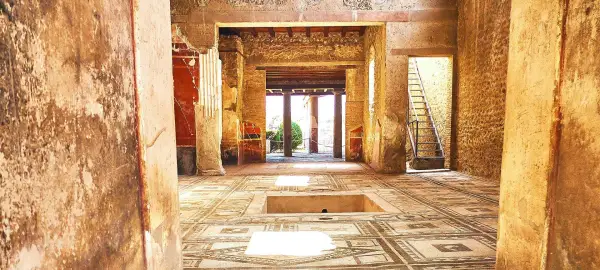- Overview
- Info & Inclusions
- Itinerary
- Map & Hotels
- Photos
- Dates & Prices
- Max Group Size 18
- Guided Valletta harbour cruise
- Pre-historic temples of Hagar Qim and Ggantija, beautiful Gozo
- Colourful fishing village of Marsaxlokk
- Ancient Greek Temples at Agrigento & Paestum
- Compelling Pompeii
- Rome - The Vatican & the Sistine Chapel
- Singles friendly (view options for single travellers)
- MealsSavour authentic flavours with included daily breakfasts and dinners at handpicked local restaurants—immersing you in local cuisine without worrying about reservations or budgets.
- Transport & Logistics
Private air-conditioned coaches and included internal ferries and flights—ensuring hassle-free travel so you can focus entirely on the discoveries ahead.
"Adventures Abroad tour leader's management and guest services managed the tour with great skill and dedication. The tour leader was on top of every move and transfer. We have not experienced any issues with logistics and had a great time."
~ JULIA O"The tour leader did an excellent job coordinating some difficult travel logistics, power outage issues and resolving problems and dealing with guests who had unrealistic expectations."
~ CYNTHIA COLLINS - Expert Guidance
Unlock insider secrets at every landmark with your full-time Tour Leader and expert local guides , all gratuities covered—no hidden tipping surprises—so you immerse fully in your destination's stories, worry-free. (Except for the tips to your tour leader at the end of your tour.)
"Amazing tour guide. Our tour guide was very well organized, Her passion, knowledge, and enthusiasm completely transformed the travel experience into something truly unforgettable..."
~ MELANIE LEMAIRE"Highly recommend every trip with Adventures Abroad. It's a well organized and well thought out adventure. The tour leaders are friendly, knowledgeable and experienced professionals. Highly recommend this company."
~ SUSAN WALL - Sightseeing & EntrancesAll entrance fees for sites visited as per the itinerary—no hidden costs—so you can explore ancient ruins and excursions with complete peace of mind.
- AccommodationsUnwind in clean, well-located 3 to 4-star hotels with private en suite facilities—handpicked for comfort and convenience after each day's discoveries—so you can rest easy knowing your stay supports the real adventure, not steals the spotlight.
- Small Group
Discover the world in small groups of up to 18 travellers plus your expert Tour Leader—unlocking spontaneity, off-the-beaten-path adventures, and genuine connections at a relaxed pace, free from crowds.
"Looking Forward to My Next Adventure The best feature of the Adventures tour was the small size that allowed the group to quickly load up, let everyone get acquainted within the first 24 hours, capitalize on unplanned surprises along..."
~ PHILIP BLENSKI"Good value for a great time I have traveled with Adventures Abroad for over 20 years now. Well thought out, interesting itineraries and the other travelers congenial and friendly. The price always seems fair and overall a..."
~ Trusted Customer - Airport Transfers For Land & Air CustomersWe handle hassle-free airport transfers for all our land and air tour customers—plus early arrivals or late departures when you book extra hotel nights directly with us for added peace of mind.
- International airfare to/from the tour.
- Tour Leader gratuities, lunches, drinks, personal items (phone, laundry, etc), air taxes (if applicable), and excursions referenced as 'optional'.
- Airport transfers for Land Only customers.
- Optional trip cancellation insurance.
- Malta's Hal Saflieni Hypogeum site and tour is a popular option should you choose to extend your stay outside of our tour. We do not include it in our program as the number of visitors per day is very limited and spaces tend to sell out well before many/most of our travellers commit to our tour
- As such, promising the visit in our itinerary is problematic. We suggest booking your own visit once our tour is 'guaranteed' to operate.
- Seasonality and Weather:
MALTA
The weather in Malta in May might just be some of the best weather the island experiences all year round. Malta in May is the perfect balance between lovely sunshine that’s not too hot and refreshing breezes that aren’t too cold. Rainfall is also uncommon, making this one of the best months in which to visit. May falls slightly before peak tourist season in Malta starts, so a bigger crowd of both locals and visitors can be expected at all the popular spots.
Visiting Malta in October can be a great choice for travellers looking to enjoy the mild Mediterranean climate at this time of the year. The average temperature during this month typically ranges around 17-24o C (63-75o F) during the day. Although October weather in Malta can still have some cloudy, rainy days, normally, it’s still a great balance with mostly summery weather without the stifling heat. So deciding on an October trip to Malta can still be a good idea as you get to enjoy the best of both worlds.
ITALY
If you’re a fan of milder weather and less-crowded travel experiences, either spring or fall is the perfect times to plan your Italian adventure. Italy is fortunate to have a temperate climate most of the year, with the summer months (June, July, and August) being the hottest.
SPRING
The weather in Sicily in May is characterized by an abundance of sunshine and gentle breezes, offering an average of 10-11 hours of daylight for exploration. As the average temperature in Sicily in May is about 18C, this month encapsulates the allure of Sicily in spring.
FALL
In Campania and Sicily, fall weather remains comfortably warm, with daytime temperatures ranging from 20-25C (68-77°F) and cooler evenings at around 14-18C (57-64°F). The coastal regions, such as the Amalfi Coast and Naples, offer an enjoyable seaside experience with temperatures ranging from 18-23C (64-73°F) during the day and around 12-17C (54-63°F) in the evenings. - Transport and Travel Conditions:
Transport throughout by private air-conditioned motor coach, 24-36 seats depending on ultimate group size (see 'group size'). Though we will have some full bus days, road travel is not particularly arduous as there are plenty of stops of interest. Roads are in good condition, though a little winding on some stretches. Short ferry crossings; small boat excursion to Blue Grotto.
This trip is typical of most of our European tours, which are ambitious and involve full days of travel and sightseeing. While we don't have any actual strenuous activity (ie hiking) built into the program, you will do a lot of walking on this trip. These walks will mostly be in the form of walking tours of towns and cities and short walks to dinner. Being Europe, and a hilly/mountainous area, cobbles, uneven surfaces, and slopes/stairs are common. If you are accustomed to typical "bus tours," which rely heavily on vehicular transport for all sightseeing activities, you should be aware that this tour is considerably more active.
Am I suitable for this tour? Please refer to our self-assessment form - Activity Level: 2
These are particularly busy tours that feature a lot of moving around, sometimes by train and short journeys on local transport. Walking tours of towns and cities are leisurely but you should be prepared to be on your feet for several hours. Some of our cultural trips that occur at high altitude and/or require greater independence with baggage handling (at hotels, airports, train stations) also fall into this category.
To learn more about the Activity levels, please visit our tour styles page. - Accommodation:
Well-located, air-conditioned, mid-range hotels and inns (3-4 star) used throughout. Some hotels are smaller properties (3-4 story) that may not have elevators. All hotels have en suite bath, though some may have shower only. Porter service is sometimes available (see 'inclusions') though you should be independent with your luggage. Single rooms are limited and likely smaller than twins. - Staff and Support:
Tour Leader throughout, driver (s), local step-on guides in various locales. - Group Size:
Maximum 18 (plus Tour Leader)
- Day 1:Arrival in MaltaWelcome to Malta!
Malta has a greater density of historic sights than any other country. Starting with its unique prehistoric temples, some of the oldest stone buildings in the world, it also has Roman catacombs, medieval towns, and the extraordinary architectural and artistic legacy of the Knights of St John (the Knights of Malta). The British left behind red letter boxes and phone booths, as well as the language, in spite of which Malta (independent since 1964) remains thoroughly Maltese. The country has thankfully shaken off the British culinary legacy and is home to some excellent restaurants specialising in Mediterranean food.
Overnight in Malta.
Included Meal(s): Dinner, if required - Day 2:Valletta: City Tour & Dingli CliffsToday we explore Valletta—Europe's smallest capital at just 1000 by 600 metres—from a vessel showcasing why this location became the Mediterranean's greatest fortress. The city commands two natural harbours whose strategic value shaped 4,000 years of history. Our harbour cruise reveals the defensive genius that saved Christian Europe from Ottoman expansion. In 1565, Jean Parisot de la Valette led 600 Knights of St. John against 40,000 Ottoman invaders in the "Great Siege of Malta." Their miraculous victory prompted Felipe II of Spain to found a new capital worthy of these heroes—Valletta, built on Renaissance military engineering principles.
From Upper Barakka Gardens, we survey Grand Harbour's fortified peninsulas—Senglea and Vittoriosa—their bastions creating interlocking fields of fire that made Ottoman conquest impossible. The Grand Master's Palace, now housing Malta's presidency and parliament, preserves the Knights' aristocratic legacy. Walking through State Apartments where European diplomacy once unfolded, we examine 17th-century Gobelin tapestries depicting scenes from the Americas—reminders that Malta's Knights wielded continental influence. The Palace Armoury houses the world's finest medieval and Renaissance weaponry collection, with thousands of armor suits testifying to the military brotherhood that dominated Mediterranean warfare for three centuries.
"The Malta Experience," screened in the Knights' former hospital, provides us the perfect historical context through a 45-minute audiovisual presentation tracing Malta's story from prehistory to modern independence.
PLEASE NOTE: Malta's Hal Saflieni Hypogeum site and tour is a popular option should you choose to extend your stay outside of our tour. We do not include it in our program as the number of visitors per day is very limited and spaces tend to sell out before many/most of our travellers commit to our tour; as such, promising the visit in our itinerary is problematic. We suggest booking your own visit once our tour is 'guaranteed' to operate.
Overnight on Malta
Included Meal(s): Breakfast and Dinner - Day 3:Valletta & Prehistoric MaltaOur Valetta sightseeing continues to St. John's Co-Cathedral, transforming our understanding of Baroque religious art. Built in the 1570s by Maltese architect Gerolamo Cassar, this masterpiece served as the Knights' spiritual heart. The interior's symphony of gold leaf, marble, and masterful painting demonstrates how military monks expressed devotion through artistic magnificence. Over 300 Knights lie entombed beneath elaborate marble floor slabs, each a decorative masterwork depicting heraldry and achievements. The Cathedral Museum houses Caravaggio's largest painting—"The Beheading of St. John the Baptist"—the only work the master ever signed, created during his turbulent Malta period (1607-1608).
The National Museum of Archaeology introduces Malta's prehistoric temple builders who created the world's oldest freestanding stone structures. These artifacts, dating to the 4th millennium BCE, represent civilizations flourishing 500-1,000 years before Egypt's first pyramids.
At Hagar Qim, spectacularly positioned on cliffs overlooking Fifla islet, we encounter architecture challenging assumptions about prehistoric capabilities. Built between 3600-3200 BCE, these temples demonstrate sophisticated understanding of astronomy and monumental construction. Massive limestone blocks—some weighing over 20 tonnes—were quarried, transported, and positioned using technologies lost to history.
Nearby Mnajdra Temple complex reveals how prehistoric Maltese developed increasingly sophisticated architectural forms. Careful alignment with solstices and equinoxes suggests these weren't merely religious centres but astronomical observatories connecting earthly worship to celestial cycles.
In Marsaxlokk village, brightly painted luzzu boats preserve Mediterranean maritime traditions, their distinctive eye symbols connecting contemporary fishermen to Phoenician customs over 2,500 years old.
Overnight on Malta
Included Meal(s): Breakfast and Dinner - Day 4:Day Trip to GozoThe brief ferry crossing to Gozo transports us to an island that feels like Malta's rural cousin. Gozo maintains a distinct cultural identity and dialect, with landscapes and traditions that modern Malta has largely abandoned. The prehistoric temples of Ggantija rank among humanity's oldest religious monuments, dating back to 3600-3200 BCE. Local folklore attributes their construction to giants, and the megaliths' sheer size is awe-inspiring. Victoria, Gozo's capital, clusters around the fortified citadel of Il-Kastell, which has been continuously fortified for over 4,000 years.
Within the citadel, the Cathedral of the Assumption showcases trompe-l'oeil ceiling paintings that create illusory domes. The Archaeological Museum reveals how successive civilizations adapted the same strategic location to serve their defensive needs. The Folklore Museum provides intimate insights into traditional Gozo life, illustrating how island communities maintained self-sufficiency through ingenious adaptation to limited resources.
At Dwejra, we witness geological forces at their most dramatic. Two enormous limestone caverns collapsed to create today's Inland Sea, a lagoon connected to the Mediterranean through a 100-metre tunnel. Local fishermen guide us through this natural wonder, past the Blue Hole and Fungus Rock, where Knights of St. John once harvested rare medicinal plants. The cynomorium coccineus growing on Fungus Rock was highly valued for its medicinal properties, reminding us how biological diversity creates economic value across cultures. Overnight on Malta.
Overnight on Malta
Included Meal(s): Breakfast and Dinner - Day 5:Mosta, Mdina & RabatThis morning, we visit the Rotunda Church of Mosta, a remarkable architectural achievement that dominates the island's central plateau. Based on Rome's Pantheon, its dome ranks as Europe's third-largest unsupported span. The church's most famous story emerged during World War II, when a German bomb penetrated the dome but failed to explode during evening mass. The unexploded bomb remains displayed as testament to faith surviving warfare's brutal realities.
We then proceed to Mdina, Malta's ancient capital, which preserves the medieval Arab city within massive fortifications. As we walk through the narrow streets, we experience urban planning designed for shade, privacy, and defensive strength. The Cathedral of St. Paul occupies the site where tradition claims the Roman governor Publius welcomed the shipwrecked apostle.
From Mdina's bastions, we take in panoramic views of Malta's landscape, understanding why successive conquerors established strongholds here. Next, we visit the nearby Rabat, where the Domus Romana reveals how wealthy Romans lived beyond official Mdina. The excavated villa's mosaic floors and columned courtyards demonstrate provincial luxury. Finally, we explore the Catacombs of St. Paul and St. Agatha, which preserve early Christian burial practices and feature characteristic agape tables.
Overnight on Malta.
Included Meal(s): Breakfast and Dinner - Day 6:Valetta, Malta - Palermo, Sicily, ItalyToday we fly to Palermo.*
Palermo is the capital of both the autonomous region of Sicily and the Metropolitan City of Palermo. The city is noted for its history, culture, architecture and gastronomy, playing an important role throughout much of its existence; it is over 2,700 years old. To gain an initial understanding of the city's unique culture, start by wandering the streets of the old city. The mix of architectural styles points to the wave upon wave of invaders who have claimed the city as their own, as does the look of the locals.
* Due to air scheduling considerations, we may elect to fly the group to nearby Catania instead of Palermo and transfer to Palermo from there (+/- 2 hours). For our purposes, Catania often has more convenient departure/arrival times.
Overnight in Palermo.
Included Meal(s): Breakfast and Dinner - Day 7:Palermo: City TourWe plunge into the sensory symphony of Il Capo market, where fishmongers display magnificent sword fish alongside glistening octopus, and Sicily's agricultural bounty creates a painter's palette of colours. Mount Etna's volcanic soil produces crisp apples, while Arab-introduced citrus trees offer their golden treasures. We sample fresh ricotta and pungent pecorino cheese, understanding how this island's fertility has sustained civilizations for centuries.
We then move to Piazza Praetoria, where the "fountain of shame" shocked 16th-century locals with its renaissance nudes—a testament to Sicily's complex relationship with outside influences. The baroque Quattro Canti divides the old city into four quarters, each corner representing a season and a Spanish monarch. At the Martorana Church, we witness the extraordinary fusion of Arab-Norman architecture, its interior ablaze with Byzantine mosaics that shimmer like captured starlight.
Our journey concludes at Monreale, the "Royal Mountain," where Norman King William II constructed a cathedral to demonstrate his kingdom's sophistication. We finish at the remarkable Church and Monastery of Santa Caterina d'Alessandria, where Dominican nuns once perfected the art of sweet-making in these very cloisters. The convent's rooftop terraces provide sweeping views across Palermo's piazzas, while the onsite bakery I Segreti del Chiostro continues centuries-old traditions.
As this is a large site, we end today's formal tour here so you can choose to linger and explore on your own before gathering for dinner this evening.
Overnight in Palermo.
Included Meal(s): Breakfast and Dinner - Day 8:Palermo - Segesta - Selinunte - AgrigentoWe journey across Sicily's ancient Greek heartland, where colonies once rivalled Athens in wealth and ambition. Sicily was part of Magna Graecia—when mainland Greece grew overcrowded in the 8th century BC, bold settlers sailed west seeking new fortunes. To them, Sicily represented what the Americas would mean to 16th-century Europeans: vast possibilities, untold riches, and considerable dangers.
Our first stop is Segesta, where a perfectly preserved Doric temple stands as testimony to Greek architectural mastery. This powerful city-state waged bitter wars with its rival Selinunte, our next destination. After a break for lunch, we explore Selinunte's magnificent ruins, once home to over 100,000 inhabitants and boasting an unrivalled temple-building program. Lost to history until a Dominican monk rediscovered its location in the 16th century, these temples rank among the ancient world's most impressive monuments.
We continue to Agrigento, where tomorrow we'll witness Sicily's most spectacular Greek legacy.
Overnight in Agrigento
Included Meal(s): Breakfast and Dinner - Day 9:Agrigento: Site Tour - Piazza Armerina - EnnaWe begin among Agrigento's magnificent temples, where five elevated structures create a picture-perfect tribute to ancient paganism's enduring power. Time, earthquakes, Punic Wars, and Christianity's rise have all tested these World Heritage landmarks, yet they remain defiant against Sicily's azure sky.
Next, we travel inland to explore Villa Romana del Casale near Piazza Armerina, a vast 4th-century complex that may have belonged to co-emperor Maximianus. This archaeological treasure houses some of the world's most beautiful Roman mosaics, including detailed hunting scenes, mythological images, and the delightful "bikini girls" performing ancient aerobics—proof that athletic fashion has ancient roots.
We then proceed to Enna, perched high in Sicily's interior. You'll have free time to explore this mountain town, perhaps visiting the Castello di Lombardia or Torre di Federico II for stunning panoramic views; your Tour Leader will point you in the right direction.
Overnight in Enna
Included Meal(s): Breakfast and Dinner - Day 10:Enna - Siracusa: Archaeological ParkWe travel toward Sicily's eastern coast, coming within sight of Mount Etna's imposing slopes. At 3313m (10,866 feet), Etna stands as one of Earth's most active volcanoes—both blessing and curse for local inhabitants. While volcanic soil creates extraordinary fertility, the constant threat of eruption looms; Catania was nearly buried by lava flows in 1669.
We arrive in Siracusa (Syracuse) and tour the Archaeological Park, including the Greek theatre where ancient dramas once echoed, the Monumental Altar of Hieron II, and the Latomia del Paradiso quarry with its famous "Ear of Dionysius." After a break for lunch, we explore Ortygia, old Siracusa's historic heart, wandering narrow streets where we discover the Temple of Apollo, Fountain of Aretusa, the main piazza, and the remarkable Duomo—a former Temple of Athena transformed into a Christian cathedral.
Overnight in Siracusa.
Included Meal(s): Breakfast and Dinner - Day 11:Siracusa - Mount Etna - TaorminaWe depart Siracusa and drive up the east coast toward Taormina, with stunning views of Mount Etna dominating our horizon. We'll make a detour and drive up Etna's slopes—have a sweater handy as we'll be approaching 1,800m (6,000 ft)! (Depending on weather, we may explore Mount Etna tomorrow instead.) This is Europe's highest volcano and one of the world's most active; its spectacular eruptions and fiery lava flows have fascinated scientists and visitors for millennia.
We continue to Taormina, arguably Sicily's most beautiful town—an ancient hilltop settlement full of history and culture, perfectly positioned between mountains and sea. Taormina's reputation for welcoming travellers spans centuries, combining incredible heritage in archaeology and architecture with genuine Sicilian hospitality.
Overnight in Taormina.
Included Meal(s): Breakfast and Dinner - Day 12:Taormina: City TouringWe begin with a leisurely walking tour starting at the almost perfectly-preserved Greco-Roman amphitheatre, Taormina's greatest treasure. This 3rd-century cliff-side arena once seated 5,000 spectators, with Mount Etna framed perfectly as a backdrop to the 1,800-year-old stage—a setting that continues to inspire artists and performers today.
We explore the Palazzo Corvaia with its fascinating blend of Arab, Norman, and Catalan elements, where Sicily's first parliament convened in 1410. The charming Corso Umberto I pedestrian street runs the town's length, lined with shops and boutiques leading to Piazza IX Aprile, where lovely views stretch across Naxos harbour to the Italian mainland. Above us rises the medieval fortress, while in Piazza del Duomo, Taormina's 15th-century basilica stands beside a fountain topped by the town's symbol: a female centaur statue.
The afternoon is yours for independent exploration of this enchanting town.
Overnight in Taormina
Included Meal(s): Breakfast and Dinner - Day 13:Taormina, Sicily - Paestum, Italian MainlandWe take a short ferry ride from Sicily to the Italian mainland and proceed by motor coach to Paestum, where three Doric Greek temples rank among the world's best preserved, rivalling those of Sicily and Athens. Originally built without mortar or cement—simply covered by terra-cotta tile roofs supported by wooden beams—these temples survived even the great earthquake of AD 69 that reduced Pompeii to rubble.
After periods of native Italian control in the 5th and 4th centuries BC, Paestum fell to Rome in 273 BC and was renamed. It remained a Roman town until deforestation of nearby hills turned the area into swampy marshland. Plagued by malaria and pirates, Paestum's ruins lay relatively untouched until rediscovered in the 18th century.
Overnight in Paestum
Included Meal(s): Breakfast and Dinner - Day 14:Paestum - National Archaeological Museum - PompeiiWe travel to Naples where we see the colourful harbour front and Castel dell'Ovo, a 12th-century fortress built on ancient villa ruins, before visiting the National Archaeological Museum. This impressive facility houses one of the world's most comprehensive collections of Greek and Roman antiquities. Built on Santa Teresa Hill as military barracks, later transformed into a university campus, it was remodelled in 1790 to receive the treasures of Pompeii and Herculaneum.
We then visit ancient Pompeii, dug out from volcanic ash and pumice stone deposited by Mount Vesuvius's eruption in AD 79. This entire area provides a fantastic record of how ordinary Romans lived their daily lives. We explore the House of Vetti, the most elegant of Pompeii's villas, and examine the intriguing House of Mysteries. The nearby House of Faun occupies an entire city block with four different dining parlours and two spacious gardens.
Overnight in Pompeii
Included Meal(s): Breakfast and Dinner - Day 15:Pompeii: Herculaneum & the Amalfi CoastThis morning we visit Herculaneum, a small town that was buried under Vesuvius's lava. Our tour here will include the baths, which were built during the reign of Agustus. An outstanding example of how the aristocracy lived is provided at the Casa dei Cervi.
We then drive along the famous Amalfi Coast on a winding road carved out of the rock in the mid-19th century. This scenic and unforgettable drive takes us to Amalfi, a resort town on the peninsula of the same name where we take a walking tour of the city. We will see the beautiful Duomo cathedral with its 13th century bell tower, the main square of the town, and the Cloister of Paradise.
After a break for lunch and some free time in Amalfi, we take the ferry to the port of Salerno where our bus will be waiting. This is a great way to truly experience the spectacular coastline with this relaxing journey (calm weather-permitting!).
On arrival in Salerno we'll rejoin our bus and return to our Pompeii hotel.
Overnight in Pompeii.
Included Meal(s): Breakfast and Dinner - Day 16:Pompeii - Monte Cassino - RomeToday's journey takes us to north to Rome via Monte Cassino. During the Roman Empire, the abbey located here was one of the great European centres of Christendom and one of the largest repositories of ancient learning. In 1944, Monte Cassino was destroyed by the Allied forces who suspected that it was occupied by German troops. The military cemetery on the nearby hill contains the graves of 1,100 Polish soldiers who lost their lives in the final assault.
Later we continue to Rome.
Overnight in Rome.
Included Meal(s): Breakfast and Dinner - Day 17:Rome: City TourWe begin at the Colosseum, where 55,000 spectators once roared as gladiators fought for survival in Rome's most brutal spectacles. Constructed nearly 2,000 years ago, this engineering marvel still dominates the cityscape. We then walk through the Roman Forum, heart of ancient civic life, where the Curia housed the Senate and the Arch of Titus commemorated military triumph. Among weathered columns and temple foundations, we witness the centre of an empire that shaped Western civilisation.
Ascending to Capitoline Hill, we reach the Campidoglio, Rome's original citadel and seat of government since the 12th century. Michelangelo redesigned this elegant square in the 16th century, creating harmonious symmetry from medieval chaos. We continue to Piazza Navona, where we break for lunch surrounded by baroque splendour. Here stands Bernini's magnificent Fountain of the Four Rivers, its figures representing the Nile, Ganges, Danube, and Plate—symbolising papal power across continents.
Next we visit the Trevi Fountain, its waters flowing from an aqueduct built in 19 BC. Legend promises that tossing a coin ensures your return to Rome. We then proceed to the Pantheon, Rome's best-preserved ancient building, where perfect proportions create an almost spiritual experience. Our day concludes at the Spanish Steps, where Romans and visitors alike gather as evening approaches.
NOTE: Due to traffic constraints and the proximity of today's sites, we'll travel primarily on foot and via Rome's efficient public transit system (tickets included). Any sightseeing not completed today will continue tomorrow afternoon.
Overnight in Rome
Included Meal(s): Breakfast and Dinner - Day 18:Rome: the Vatican Museums & St. Peter'sWe travel by metro across the Tiber River to Vatican City, the world's smallest sovereign state. Our guided tour begins in the vast Vatican Museums, where corridors seem to stretch infinitely, lined with humanity's greatest artistic achievements. Here we discover Greek and Roman sculptures that influenced Renaissance masters, Flemish tapestries depicting biblical narratives, and glittering mosaics assembled tile by precious tile. More than three million visitors journey here annually to witness this extraordinary collection.
The museums' crowning glory awaits in the Sistine Chapel, where Michelangelo's frescoes transform ceiling and walls into a theological masterpiece. Created between 1508 and 1512, these paintings revolutionised art history—their anatomical precision and emotional depth remain unsurpassed. We then enter St. Peter's Basilica, Christendom's largest church, its cavernous interior housing treasures including Michelangelo's tender Pietà, carved when he was just 24 years old. Outside, the elegantly symmetrical Piazza San Pietro embraces visitors in Bernini's colonnade arms.
After a break for lunch, we continue with any sightseeing carried over from yesterday.
NOTE: The timing and order of today's sightseeing may vary depending on seasonality. During lighter periods, we often begin in the morning; busier times may require an afternoon or evening visit to avoid crowds. We may include lunch instead of dinner today to optimise our schedule. Your Tour Leader will advise upon arrival.
Overnight in Rome.
Included Meal(s): Breakfast and Dinner - Day 19:DepartureDeparture from Rome.
VIAGGIO BUONO!
Included Meal(s): Breakfast
Countries Visited: Italy and Malta
*The red tour trail on the map does not represent the actual travel path.
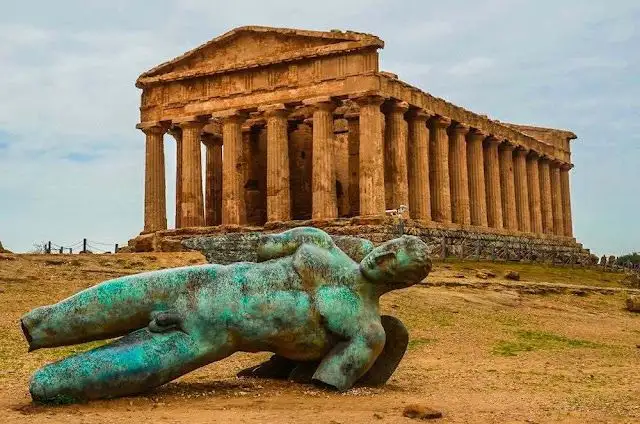
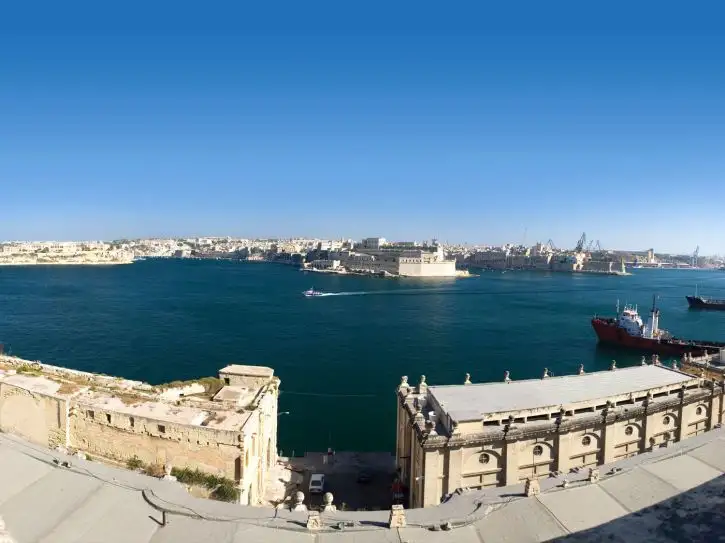
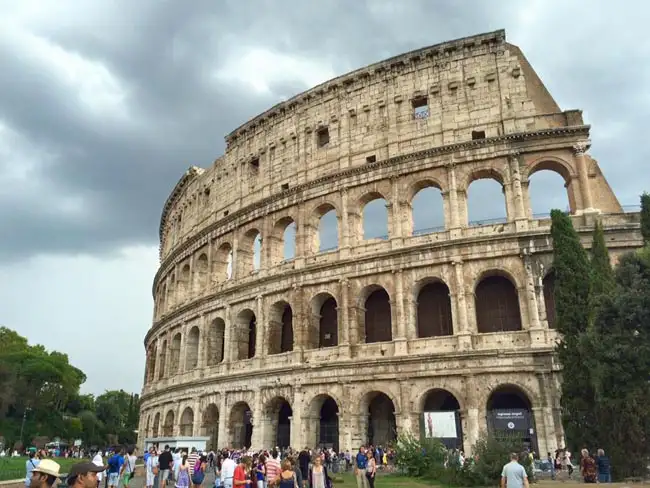
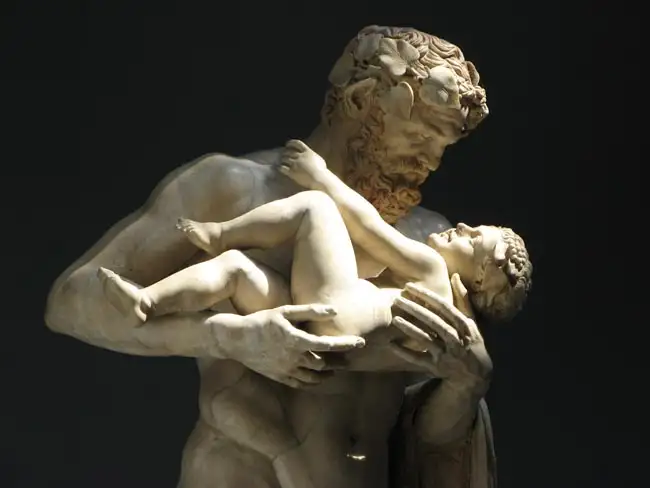
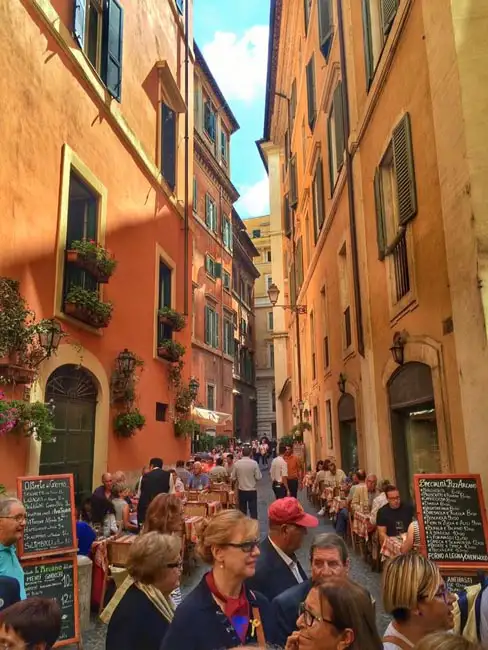
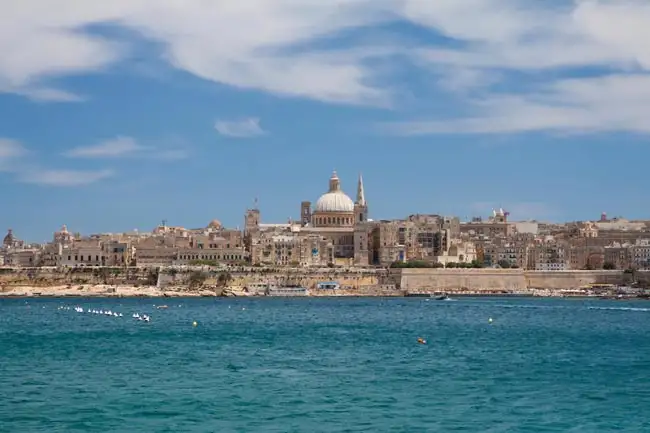
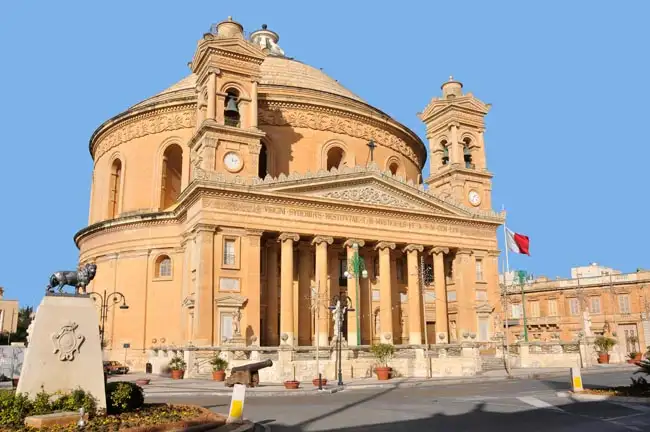
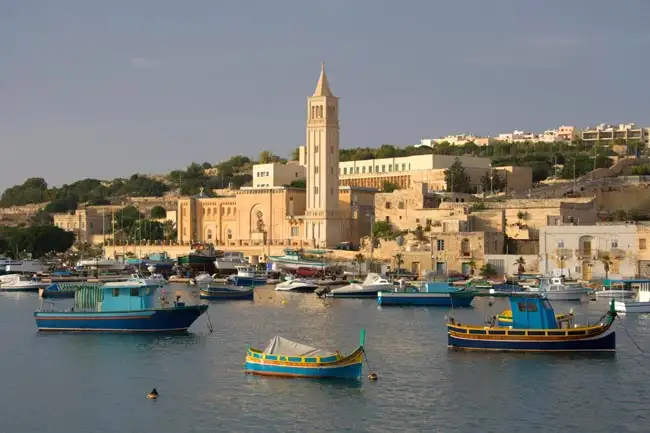
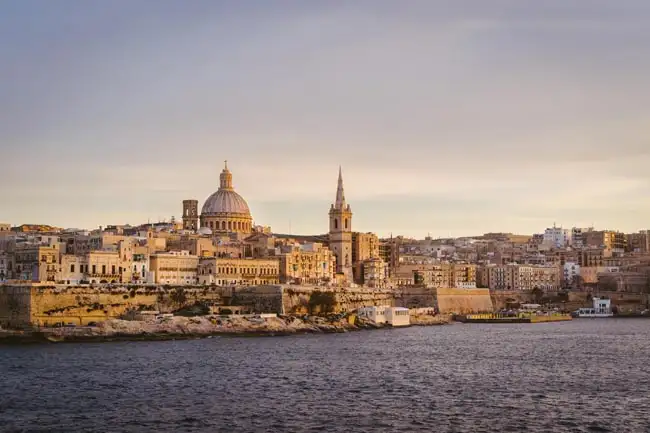
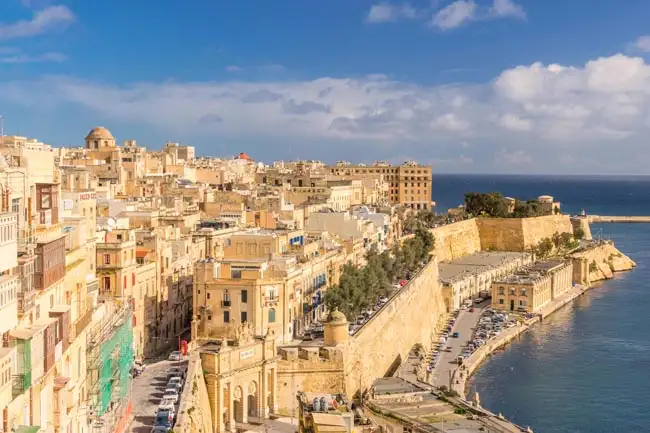
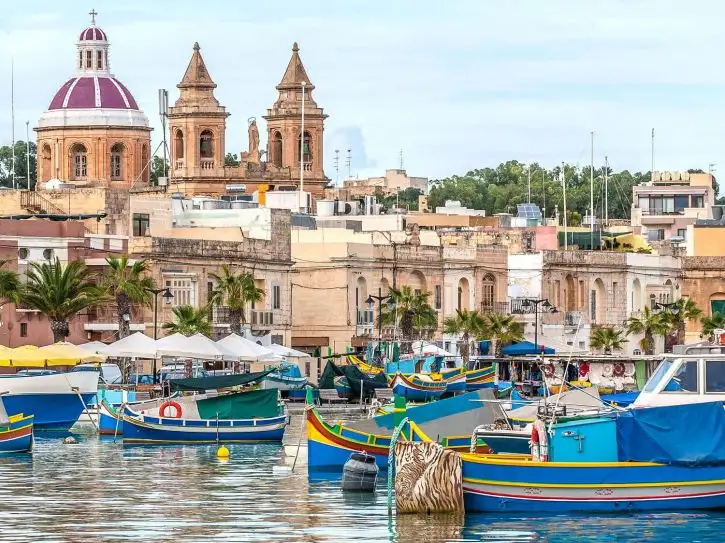
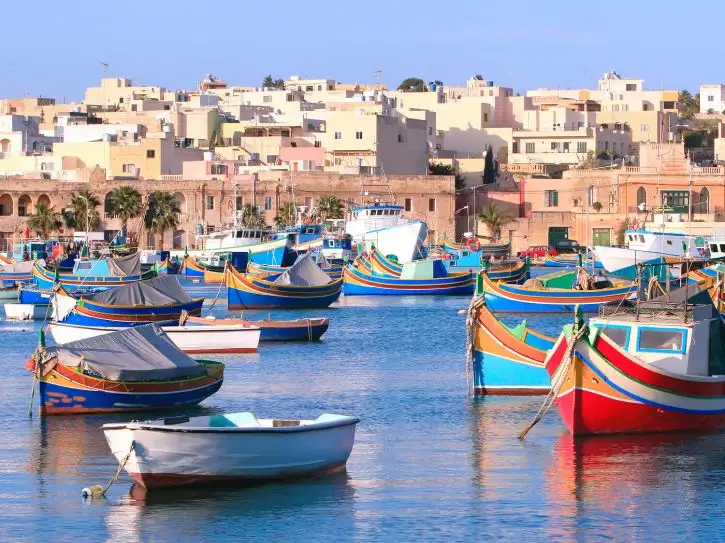
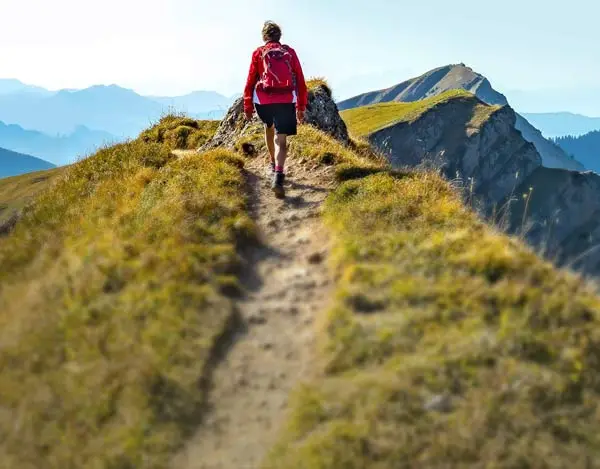
Book This Tour
- Final payment: Due 90 days prior to departure.
- Deposit: A non-refundable $500 USD Deposit is required at booking.
- Internal Flight Taxes: An extra $105 USD applies for taxes and fees on tour flights. The internal airfares are included, but taxes are listed separately as they may change. Exceptions are noted in Red.
- Optional Single Supplement: $1820 USD (number of singles limited).
(View options forsingle travellers) - Transfering Tour or Date: Transferring to another tour or tour date is only permissible outside of 120 days prior to departure and is subject to a $100 USD change fee.
(Read our cancellation policy)
Prices below are per person, twin-sharing costs in US Dollars (USD). Pricing does not include airfare to/from the tour and any applicable taxes.
Frequently Asked Questions
- What is the maximum number of participants on a trip?Most of our tours carry a maximum of 18 participants; some tours (ie hiking tours) top out at 16. In the event that we do not achieve our minimum complement by our 90-day deadline, we may offer group members the option of paying a "small-group surcharge" as an alternative to cancellation. If all group members agree, we will confirm the trip at existing numbers; this surcharge is refundable in the event that we ultimately achieve our regular minimum. If the small group surcharge is not accepted, we will offer a refund of your deposit or a different trip of your choice.
- Can I extend my tour either at the beginning or end? What about stopovers?Yes, you can extend your tour either at the beginning or the end and we can book accommodation in our tour hotel. Stopovers are often permitted, depending on air routing. Stopovers usually carry a "stopover" fee levied by the airline.
- How do I make a reservation? How and when do I pay?The easiest way to make a reservation is via our website; during office hours, you are also more than welcome to contact us by telephone.
A non-refundable deposit is payable at the time of booking; if a reservation is made within 90 days, full payment is required. Some trips require a larger deposit. If international airline bookings require a non-refundable payment in order to secure space or the lowest available fare, we will require an increase in deposit equal to the cost of the ticket(s).
Early enrolment is always encouraged as group size is limited and some trips require greater preparation time.
Once we have received your deposit, we will confirm your space and send you a confirmation package containing your trip itinerary, any visa/travel permit related documents, invoice, clothing and equipment recommendations, general information on your destination(s), and forms for you to complete, sign and return to us. Your air e-tickets (if applicable), final hotel list, final trip itinerary, and instructions on how to join your tour, will be sent approximately 2-3 weeks prior to departure. - What about cancellations, refunds, and transfers?Please review our cancellation policy page for details.
- I am a single who prefers my own room. What is a single supplement?All of our tours have a single supplement for those who want to be guaranteed their own room at each location.
This supplement is a reflection of the fact that most hotels around the world do not discount the regular twin-share rate for a room by 50% for only one person occupying a room. Most hotels will give a break on the price, but usually in the range of 25-30% of the twin-share rate. This difference, multiplied by each night, amounts to the single supplement.
The conventional amount can also vary from country to country and some destinations are more expensive than others for single occupancy. In order to be "single friendly," the supplements we apply are not a profit centre for us and we do our best to keep them as reasonable as possible.
On most tours we limit the number of singles available, not to be punitive, but rather because many hotels allow for only a limited number of singles; some smaller hotels at remote locations also have a limited number of single rooms available.
Please note that most single rooms around the world are smaller than twin-share rooms and will likely have only one bed. - Do you have a shared accommodation program?Yes! If you are single traveller and are willing to share, we will do our best to pair you with a same-gender roommate. Please note that should we fail to pair you, we will absorb the single supplement fee and you will default to a single room at no extra charge.
